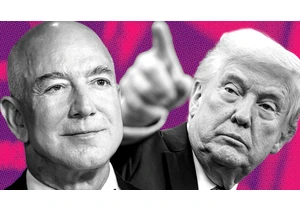When a truck breaks down, its driver knows what to do. They pull over to the side of the road, put on their hazard warning lights, and lay out safety triangles to warn other drivers about the risk of the parked vehicle. Except that might not be the case much longer if autonomous trucking company Aurora Innovation has its way.
The company, which wants to launch its services in full this April, has lodged a court case against the need to put out safety triangles, because its uncrewed vehicles wouldn’t be able to do so. It’s a small proposed change to road safety law that could have huge ramifications—and is an augur of challenging times ahead for drivers in America and elsewhere.
“As self-driving vehicles move into the real world, their creators will inevitably apply pressure to change the rules of the road,” says Jack Stilgoe, a science and technology professor at University College London. “Roads and the rules that govern them have been made to be human-readable. Self-driving vehicles will not drive in the same way. They need the world to be machine readable.”
The arguments AV companies make in favor of their appeals are simple: This is the future, and we need to prepare now in order to unlock the benefits of the technology they’re developing. But it shows a lack of care about what happens in the interim—or even after these self-driving vehicles hit the road—to human drivers, says Missy Cummings, a researcher specializing in self-driving vehicles at George Mason University.
“I don’t think the companies care about [the impact on human drivers],” she says. “I don’t think that’s in their calculus. They’re only looking at their bottom line.” Cummings adds that the appeal by Aurora is particularly surprising given they’ve struggled to show evidence their system can work at scale to date.
“My first thought was it’s interesting they’re so focused on this regulatory issue when there’s actually been no evidence that the trucks themselves can actually drive for significant periods of time without having some kind of problem,” she says. (The company was reaching 75 mph speeds on a 7.5-mile test track in April 2024, according to industry reports.)
One of the arguments self-driving vehicles make for weakening road rules is that humans don’t follow lots of them, so their products shouldn’t have to, either. “Teslas were programmed at one point to roll through stop signs rather than stop at them,” points out Stilgoe. Cummings says she regularly tells people she’s lucky to live in a state where there aren’t frequent self-driving vehicles prowling the streets. “I do think that it’s going to be an interesting few years if there is an uptick in accidents,” says Cummings.
Still, if you believe the hype, self-driving vehicles are coming, and so changes arguably will need to be made to accommodate the foibles of the system. But it’s important not to let tech companies—who have a self-interest in self-driving—make the hard yards on this without human checks and balances. And at a time when the balance of power is shifting in the White House, it makes sense that companies may feel now is an apposite time to try and lobby regulators and shift laws. “I feel like [Aurora is] taking advantage of the Trump administration,” says Cummings. “They’re getting this on the book, so that when he rolls in, he can wipe this old regulation out.”
But doing it properly—and safely—needs to be paramount, argue the experts. “Of course, there will be some areas where updating the rules of the road will make everyone safer,” says Stilgoe. “But the rules are political. We recently saw the rules change in the U.K. to benefit cyclists and pedestrians, which has annoyed some drivers. If the rules change just to benefit tech companies, people will ask who’s benefiting from the tech.”
And while a small warning triangle may seem like small beer for road users, it could be the slippery slope to more uncertain road environments. “Any upgrade to the rules also creates a burden on others—other road users as well as the police—to understand it and accommodate it.” And yes, that includes small safety triangles. “People know what a warning triangle means,” says Stilgoe. “They won’t necessarily understand the self-driving companies’ proposed alternatives.”
Inicia sesión para agregar comentarios
Otros mensajes en este grupo.

Consumers are only just starting to feel pain from Trump’s Liberation Day tariff spree. Amazon

When Donald Trump returned to the White House in 2025, many in the tech world hoped his promises to champion artificial intelligence and cut regulation would outweigh the risks of his famously vol

The first 27 satellites for Amazon’s Kuiper broadband internet constellation were launched into space from Florid

There are so many ways to die. You could fall off a cliff. A monk could light you on fire. A bat the size of a yacht could kick your head in. You’ve only just begun the game, and yet here you are,

Former Tinder CEO Renate Nyborg launched Meeno less than two years ago with the intention of it being an AI chatbot that help

The most indelible image from Donald Trump’s inauguration in January is not the image of the president taking the oath of office without his hand on the Bible. It is not the image of the First Lad

Ernest Hemingway had an influential theory about fiction that might explain a lot about a p
